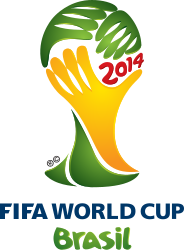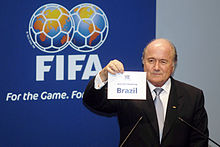
A | B | C | D | E | F | G | H | CH | I | J | K | L | M | N | O | P | Q | R | S | T | U | V | W | X | Y | Z | 0 | 1 | 2 | 3 | 4 | 5 | 6 | 7 | 8 | 9
| Copa do Mundo da FIFA Brasil 2014 (Brazilian Portuguese) | |
|---|---|
 Juntos num só ritmo (lit. 'Together in a single rhythm') | |
| Tournament details | |
| Host country | Brazil |
| Dates | 12 June – 13 July |
| Teams | 32 (from 5 confederations) |
| Venue(s) | 12 (in 12 host cities) |
| Final positions | |
| Champions | |
| Runners-up | |
| Third place | |
| Fourth place | |
| Tournament statistics | |
| Matches played | 64 |
| Goals scored | 171 (2.67 per match) |
| Attendance | 3,429,873 (53,592 per match) |
| Top scorer(s) | (6 goals)[1] |
| Best player(s) | |
| Best young player | |
| Best goalkeeper | |
| Fair play award | |
The 2014 FIFA World Cup was the 20th FIFA World Cup, the quadrennial world championship for men's national football teams organised by FIFA. It took place in Brazil from 12 June to 13 July 2014, after the country was awarded the hosting rights in 2007. It was the second time that Brazil staged the competition, the first being in 1950, and the fifth time that it was held in South America. Fans and pundits alike consider this edition of the World Cup to be one of the best ever held.[6][7][8]
31 national teams advanced through qualification competitions to join the host nation in the final tournament (with Bosnia and Herzegovina as the only debutant). A total of 64 matches were played in 12 venues located in as many host cities across Brazil. For the first time at a World Cup finals, match officials used goal-line technology, as well as vanishing spray for free kicks.[9] FIFA Fan Fests in each host city gathered a total of 5 million people, and the country received 1 million visitors from 202 countries.[10] Spain, the defending champions, were eliminated at the group stage. Host nation Brazil, who had won the 2013 FIFA Confederations Cup, lost to Germany 7–1 in the semi-finals and eventually finished in fourth place.[11]
In the final, Germany defeated Argentina 1–0 after extra time thanks to a Mario Götze half-volley in the 113th minute of the final to win the tournament and secure the country's fourth world title, the first after German reunification in 1990, when as West Germany they also beat Argentina by the same score in 90 minutes in the World Cup final. Germany became the first European team to win a World Cup staged in the Americas,[12] and this result marked the third consecutive title won by a European team, after Italy in 2006 and Spain in 2010.[13][14]
Host selection

In March 2003, FIFA announced that the tournament would be held in South America for the first time since 1978, in line with its policy at the time of rotating the right to host the World Cup among different confederations.[15][16] With the 2010 FIFA World Cup hosted in South Africa, it would be the second consecutive World Cup outside Europe, which was a first for the tournament. It was also sixth time (second consecutive) in the Southern Hemisphere.[17] Only Brazil and Colombia formally declared their candidacy but, after the withdrawal of the latter from the process,[18] Brazil was officially elected as host nation unopposed on 30 October 2007.[19]
Participating teams and officials
Qualification
Following qualification matches played between June 2011 and November 2013, the following 32 teams – shown with their last pre-tournament FIFA world ranking[20] – qualified for the final tournament. Twenty-four of these teams were returning participants from the 2010 World Cup. Bosnia and Herzegovina were the only team with no previous appearance at the World Cup finals.[nb 1][21] Colombia qualified for the World Cup after 16 years of absence, while Belgium and Russia both returned after 12 years. Paraguay failed to qualify for the first time since 1994. This was also the first World Cup for 32 years that did not feature a representative from the Nordic countries. Iran, Costa Rica, Ecuador, and Croatia returned to the tournament after missing the 2010 tournament. The highest ranked team not to qualify was Ukraine (ranked 16th), while the lowest ranked team that did qualify was Australia (ranked 62nd).[20]
|
|
|
|

